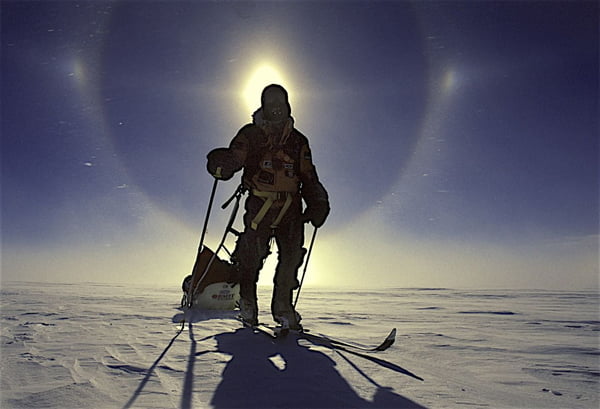
Daily Mountain
48 years, Australia
48 noted polar explorers declare support for National Geographic criticism of Portlander Colin O’Brady
This article first appeared on http://www.oregonlive.com. The original can be read here.
by Douglas Perry | The Oregonian/OregonLive
The polar veterans who criticized Portland-based adventurer Colin O’Brady in a recent National Geographic article are not backing down.
 Many polar adventurers have voiced their support for National Geographic's criticism of Portlander Colin O'Brady. (Photo courtesy of Eric Philips) Eric Philips
Many polar adventurers have voiced their support for National Geographic's criticism of Portlander Colin O'Brady. (Photo courtesy of Eric Philips) Eric Philips
They and others signed a brief statement that rejected O’Brady’s demand that National Geographic retract the article.
The “Declaration of Support,” released Friday and signed by 48 polar professionals, explorers and extreme athletes, states in full:
In regard to the article originally entitled “The Problem with Colin O’Brady” written by Aaron Teasdale and published by National Geographic, we, the professional polar adventuring, exploring and guiding community, support the article in its entirety.
We request that the article not be retracted and stand as testament to the importance of preserving truth, integrity and history in our field of endeavor.
Among those who signed the statement are “On Thin Ice”author Eric Larsen and International Polar Guides Association president Eric Philips, both of whom criticized O’Brady in the article. The list of signees also includes Borge Ousland, whose little-known 1997 solo trek across Antarctica, the National Geographic article argues, deserves greater acclaim than O’Brady’s.
n 2018, O’Brady, 34, raced across Antarctica alone and “unsupported” -- that is, solely by muscle power. He and others heralded the accomplishment as a “first.” In January, O’Brady’s memoir about his experience, “The Impossible First: From Fire to Ice -- Crossing Antarctica Alone,” was published. Kirkus Reviews called the book a “brutally sublime tale of derring-do.”
Ousland’s much-longer journey -- 1,864 miles, compared to O’Brady’s 932 miles -- technically wasn’t “unsupported,” because at times he used a makeshift kite to aid his progress.
In its article, National Geographic stated that “key details” of O’Brady’s account of his Antarctica journey “do not withstand scrutiny,” such as his claim that he passed through what he calls “off the map” areas where no one would have been able to rescue him.
Philips, in an email release accompanying the statement of support, said “O’Brady and his exaggerated self-promotion was strongly and widely rejected by the polar community. We’ve been grappling with how to set the record straight ever since, and the National Geographic article aided our efforts and was greatly appreciated.”
Philips says that many of the key claims O’Brady has made about his expedition -- that it was “considered impossible, people had been trying to accomplish it for a century, a previous explorer died attempting it, and he was often beyond rescue” -- are false.
Check out the full list of “Declaration of Support” signees.
O’Brady, in a 16-page response to the article earlier this month, insisted his descriptions of his polar experience are accurate, and that his “route and methods” added up to a legitimate first. He called on National Geographic to retract the article, declaring that it “misrepresents a historic polar expedition by omitting key facts and fails to contextualize a number of items.”





